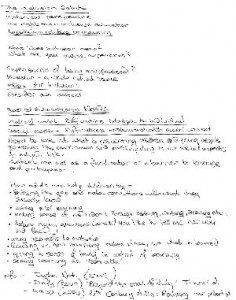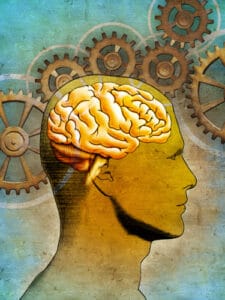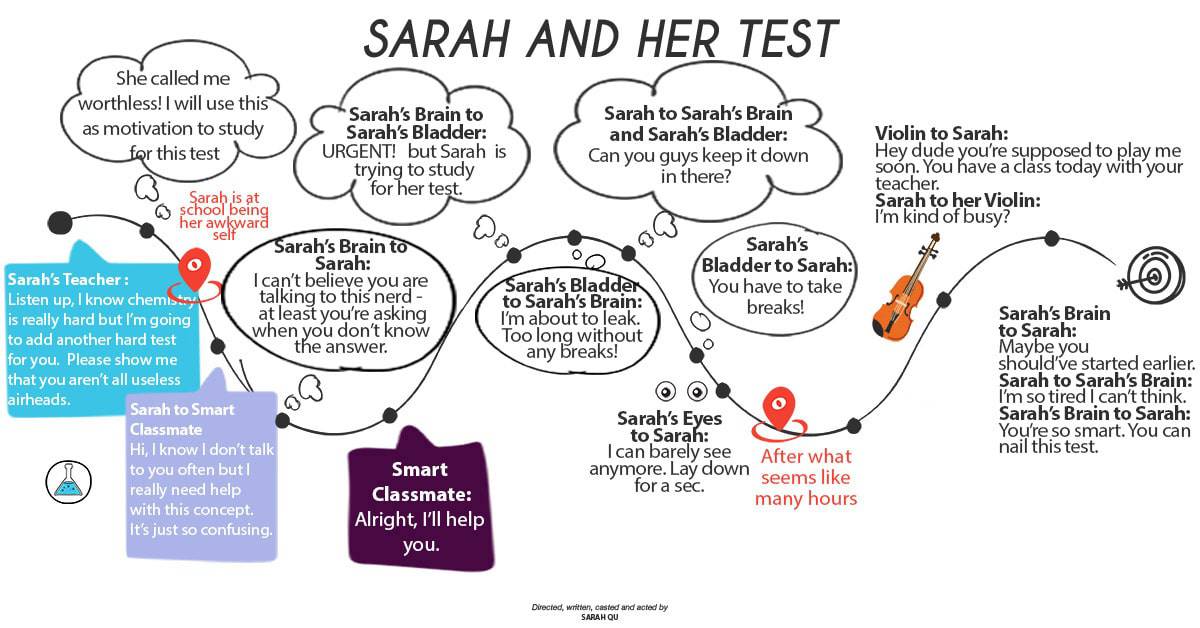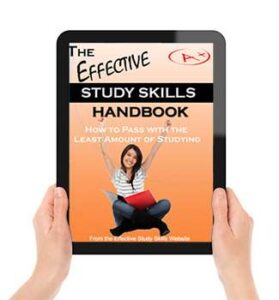How to Study – The Complete Guide
- Posted by Brian Stocker MA
- Date August 25, 2015
- Comments 2 comments
How to Study - The Complete Guide
Lets Get Started!
Most students have no idea how to study effectively. Many teachers focus on getting good test scores, and understandably so, without focusing on teaching the basics of study skills. The result is that the students either don’t study, or spend hours studying with poor results, or study at the last minute and burn out.
Here are some techniques that have been successfully utilized by middle school and intermediate school students to study and prepare for tests.
If you don’t think you need to learn how to study – consider this – By studying effectively you will spend less time studying, get higher marks and have more time to yourself!
Not getting organized, taking proper notes hurts you in the long run and will take more time, and you’ll get poor marks.
And don’t forget to keep it light!
7 Steps to better study skills
So lets dive in!
First – get woke
Get Organized
Keep your study materials well organized. Use a separate folder to keep materials for each subject. Papers, assignments, homework, reports and anything that needs to be submitted should be kept on one side of their folder. The other side can contain handouts, tests results, corrected or returned homework and the likes. Learn to keep all papers and items used for the subject in the folder until you complete the semester and are through with the subject. This way it is always easy to access any paper when needed.
Relax – STRESS MANAGEMENT
Not all stress management techniques are suitable for students because of the time involved. The following stress management techniques are not only some of the most common, but also are well suited to students:
- Do not wait. If you know that you have an assignment due or an exam looming on the horizon, do not wait until the last minute to open your text. By starting early and focusing on small amounts each day, you will be prepared for the exam or have the assignment finished well before the due date. When you wait until the last minute, you increase your stress and anxiety, and your performance typically suffers. Find out how to Make a Study Plan
- Perform routine maintenance. Just as a car needs maintenance, like an oil change, your body needs its own version of routine maintenance. You need to eat regular, healthy meals and get plenty of rest. In addition, take personal time to take a walk, go out with friends, or do other activities that you enjoy. Taking care of you creates a more positive mood and better performance.
- Exercise. Physical exercise is not only good for your body, but it also serves to relieve stress. Engaging in physical activities increases your circulation, clears your mind, and boosts your overall energy level. Exercise also decreases levels of stress hormones, like cortisol, helping you to feel more relaxed. Of course, there is also the benefit of having a physical release for negative emotions, like anger or hostility.
- Use relaxation techniques. The use of relaxation techniques, like visualization, meditation, and breathing exercises, are stress relievers that can be practiced any time. You do not need special equipment or a great deal of space for these, making them a great tool while sitting in the classroom preparing to start an exam. Relaxation Techniques from the Mayo Clinic. Mindfulness and studying
- Get organized. One of the major factors in stress for students is lack of organization. Make a schedule that shows where you have to be and when, as well as when assignments are due and when exams are scheduled. Organize your study area so you can find books, notebooks, and pencils or pens quickly and easily. Simple organization will take care of missed deadlines and forgotten assignments, and it will prevent you from being stuck with starting assignments at the last minute.
The Waiting Game: Making Use of Your Daily Routine
One of the main concerns students have: not having enough time in a day to complete everything they need to. Students do not realize that they have several breaks in their day that they can use more effectively. They also do not realize how much time they spend playing “the waiting game”: waiting in line or waiting for something else to be finished before they will resume studying. By using these “breaks” more effectively, they can give themselves real breaks and still have time for social life and sleep.
- Commute
Students commute to class anywhere from 5 minutes to an hour. Usually there is a long wait time for the bus: they could use that time, and the time spent on the bus, to review their readings, listen to audio recordings, or review pre-written flashcards. Even if the bus is noisy, it will test their concentration skills and how they react under pressure.
- Exercise
Students generally find it difficult to balance a healthy lifestyle with their studies. Depending on the workout, they can incorporate some time to study. Treadmills and ellipticals have a flat table surface on them: students can use this to put their notebook on and review their notes while they do some cardio.
- Phones
Students spend a lot of time on their phones. By downloading flashcard apps they can use their phones more effectively. They could also watch youtube videos on a given subject.
- Meal Prepping
Meal prepping requires a lot of planning and time spent waiting for meals to cook. Students generally opt for quick meals such as pasta or rice. Both of these meals require waiting for water to boil then waiting for the food to cook. Students can use this time to pull out their flashcards or review their readings.
- Laundry
Students dread doing their laundry: it consumes too much of their time and they spend most of it procrastinating, while waiting for it to finish. Students can bring their books or flashcards to the laundry room. Students usually set a timer for when the laundry is done; they can use this time to complete a mock test and see how well they perform or how much they know during the limited amount of time.
- Waiting in line
Students generally need their coffee or snack fix while studying. The wait times on and off campus stretch out the door. By the time they go to order 15 minutes has gone by. Students should bring their flashcards, paper or electronic, to pass the time and utilize their study time. Coffee shops are generally loud and chaotic, which will also test the students concentration skills.
Students always find themselves in a time-crunch. Once they realize they can incorporate studying into their daily routine without cutting into their social life or sleep schedule they will reduce their stress and notice an improvement in their academic results. Thus, “the waiting game” does not have to be a waste of time or an excuse to procrastinate.
WATCH CAFFEINE

Energy drinks have further complications, because some contain effedrine as well as caffeine.
Caffeine helps in the short run. It gives you a jolt, you can stay awake to follow what the professor says or to finish up a paper. But you don’t know when it will wear off, so you might not be able to get to sleep once the paper is done. And when it does wear off, you will feel as low when it departs as you did high when it first kicked in.
What if you can’t have it and you have to stay awake?
Some people are allergic to caffeine, others have sensitive stomachs, and people with heart conditions are often forced to limit their intake. If you have to stay awake and you can’t have caffeine, what can you do?
The best thing, of course, is to pace yourself and stay ahead of your course work. Slow but steady really does win the race. But if you can’t, then you need what caffeine supplies: stimulation. You can study with the window open, play music, or study with a friend who can help keep you awake.
Be sure to catch up on lost sleep.
What ever you do, be sure to catch up on your sleep after. The “sleep deficit” that builds up over time can rob you of your joy and affect your academic performance!
Poor sleep can make you inattentive and slow, forcing more all-nighters, increasing the sleep deficit. It’s a bad cycle, but one you can avoid.
In the long run, it’s better to keep yourself from needing caffeine. But if you need it, a little won’t hurt and can give you the jolt it takes to get the job done.
Get Motivated.
Yes you may have better things to do, and yes it may be unfair – but it is the way things are so don’t fight reality. Get motivated and settle down to it. Getting Motivated to Study
Studying from Textbooks
How to Handle Textbooks
The reading of textbooks is an integral and unavoidable part of your college education. Although in the classroom a teacher may cover much of the content of the subject matter, many of the details of the topic will be fleshed out from your textbook. Unfortunately much of the material you will encounter in a textbook can be dry, making it difficult to stay focused and study. Concentration is essential to your success in the class. Read More >>>
Studying from a Computer
How to Study a Novel
Studying Novels
From high school to college, novels are a crucial part of the learning experience. Reading novels not only teach us about different worlds, eras, and people, but they also encourage us to explore our imagination. Novels can also be fun! For these reasons, they are an integral part of a proper education and an important part of learning how to study. It’s important not to be intimidated by the language and issues in novels. Instead, focus on what you do know, and practice strategies that can help you navigate the text. We have compiled a list of tactics for you to use alongside reading. Read more >>>
SQ3R – SURVEY – QUESTION – READ – REVIEW – RECITE
SQ3R
The SQ3R study method is a technique that goes back decades, and possibly more than a century. Still, there always seem to be those who have never heard of this classic way of studying your textbooks. So for that group of people, let’s talk about it.
SQ3R is a study method which can be applied to any textbook for any of your college (or high school) classes. And yes, each letter and number has an important meaning.
“S” STANDS FOR SURVEY
The first thing you should do is survey the material in the book, the chapter or the section you’re reading. This means you scan the material in its entirety. As you do so, pay attention to how the information is organized and formatted. Take a look at the table of contents and the various chapter titles and topic headings. Look at any outlines and bullet points. And as you survey, take some brief notes.
“Q’ STANDS FOR ASKING QUESTIONS
These are questions that you don’t yet know the answers for, but which you expect the text to answer. In short, this is material that expect to learn.
3R means simply that there are three important words to remember that start with the letter “R.” The first one is READ. After you’ve surveyed and come up with some questions, read the material thoroughly. As you do so, think about your questions and see if you can find the answers to these questions. Again jot down some notes about the important points you encounter in your reading. Once you complete the reading, think about whether all of your questions were answered. If so, write down those answers now.
“R” IS FOR REVIEW
You need to focus on your text notes and markings and review those points in your mind. Really concentrate on mastering these points.
“R” STANDS FOR RECITE
This means you need to be able to vocally enunciate all that you’ve learned from this book or section. If you cannot recall something well enough to put it into words, you might not know it well enough for the test when it’s given. So recite the major points again and again until they are engraved on your brain. As you complete your SQ3R process, you’ll be impressed what you recall–and you’ll know why so many generations of students have used it.

Bewilderment+Exposure=Obvious
When you encounter a new concept, it may seem utterly confusing at first, but with exposure, the concept becomes obvious and almost second nature. Many students think that if they don’t understand a concept right away, they must be incapable which deters them from studying.
What helped me study better is realizing it’s just a matter of time and practice until the concept clicks. Combine that with a curiosity and motivation to learn and I was able to get high 90s in all of my classes

Fail!
This may sound controversial, but the next piece of advice is to fail often. Now I don’t mean intentionally miss a deadline or don’t show up to a test, failing is about working out practice solutions and getting them wrong. Failing is learning from your past experiences and building on your previous knowledge. If you get a poor mark on a test or a project, ask your teacher, professor, or whomever what you can do to improve.
Look at the questions you got wrong and make a mental or physical note of them. You remember the wrong answers more readily than the right ones, so I encourage you to grow from your failure.
Note to Self! Taking Notes is Very Important!
Taking Notes
Be sure to take notes! Often teachers will hand out a summary of what is on the test. Organizing, reviewing and rewriting your class notes are effective ways of implanting information into memory. Check your past notes and check for ways that you can rewrite or re-organize them to make better sense and sound better. Once you have summarized your notes, summarize the summary.
Note Taking Styles
Most students don’t realize there are different styles – Just writing things down is a good start but you can do much better and much more efficient.
Keep and Organize Handouts.
You can also rewrite and reorganize your handouts and other study materials received from teachers. The material found in your handout must be important for the teacher to include it. That means you need to identify key areas in the handouts and learn them. Rewrite and summarize important ideas from the handouts to keep them in your memory.
Forming a Study Group
Study Groups
Study groups are a great way to supplement your individual study. Being involved in a study group provides you with the opportunity to get feedback on how well you know the material, as well as reinforcing what you have learned. In addition, a good study group gives you practice at working as part of a team, a skill that you will need in the world outside of school. Read more >>>
How Long should you Study for?

Learn your Learning Style
Learning Styles
Everyone studies differently and what works for one person may not work for you. Finding your learning style is a huge help – the way that you learn will increase your efficiency and make the whole process much easier.
Learning Styles Quiz
Learning Styles – How to Study for each Learning Style
Studying for (Achievement) Content Exams and Aptitude Exams
Achievement vs. Aptitude
Content exams and aptitude test are quite different and need different study strategies – Read More >>>
Application courses are some of the most challenging to study for as usually you are not given what will exactly be on the exam. Usually biology courses follow that route. The learning objectives usually include the terms: analyze, explain, and apply. Usually the best method to study for these courses are previous exams and practice questions. Do the practice questions over and over again without the answer key. Reading the textbook at least once throughout the semester however the textbook is not as essential as it is in an anatomy class for instance. How to Study from Textbooks. How to study textbooks – a quick survey.
Skills-training courses. The learning objectives for those classes are generally “be able to –“ type of objectives. One of my favorite skills-training classes is organic chemistry. The best way to study for these classes is practice, practice, practice. Whenever you can and where ever you can, I usually use the practice questions for these classes as a way to relax my brain when I am studying for memorization-based classes or application classes. These classes are usually the most fun as you can very easily see your progress the more you practice. If cramming for these classes, practice truly makes perfect. How to cram
How to Study from your Notes
Study from your Notes

Hopefully the teacher provided an outline on what to study for the test, if they did then go through your notes and separate the things the teacher said to study from the unit. Once you separate them, get all the notes that fall under what the teach said to study. But if the teacher didn’t, then go through and separate the big ideas from the units. Ideas with a lot of notes that branched off into other big ideas or even branched into the next unit are usually good pointers that they should be studied.
Take time to understand the chunks
Great, now you have all these chunks of notes. Now it’s time get crackin’ and read through them. Try and understand the major ideas, most likely that small text box labeled “Fun Fact!” isn’t as important as the “unit overview” box. Read through the big themes or reoccurring topics and take time to understand them. Don’t worry about the small details yet, just focus on the big themes.
Get out your microscope
After you have taken time to understand the big ideas from the unit, you have to understand all the details of the unit. Go through every chunk, and look at all the details. Everything that is important to understand for the unit.
Studying Math
How to Study Math
Math is a different subject and needs a slightly different approach. Perhaps more than other subjects, math builds on previous learnings – so – if you don’t understand something, stop and figure it out. If you ignore and go forward it will come back on you!
For math students, make sure that you practice with the math problems at the end of each chapter. Also practice with the sample tests in your math textbook. Your ability to solve the problems found in your textbook simply means that you are prepared for the test.
Take the time to revise their homework. Study and redo those math problems that you failed before. Understand the questions and correct your mistakes. If required, ask your teacher or someone else to put you through the problems that you can’t do on your own.
Science and Social Studies
 Studying Science and Social Studies
Studying Science and Social Studies
Science and social studies textbooks usually have questions at the end of study units or chapters. Many teachers include either the exact questions from the textbooks, or very similar questions on the tests. Even if the exact questions do not come up on the test you will know your stuff.
Basic Science Practice Questions
Social Studies Practice Questions – Economics
Social Studies – Civics and Government
Canadian History (GED)
News Flash! Use Flash Cards
Flashcards
Flash cards are one of the most effective study tools. Tips for using flash cards:
On one side of the card write down a word and on the other side write down the definition of the word. For example, you can write down the word “Noun” on a side of the card and then write its definition “name of a person, animal place or thing” on the other side.
Call out the word “noun” and then turn the card and read out “name of a person, animal, place or thing.” Repeat this over and over and soon you can say out the definition of the word without using the card.
After going through all the flash cards you prepared, you can then go over the cards again on the reverse. Instead of first calling out the word, you read the definition and try to remember the word on the other side. Call out the words as this helps learning and memory (auditory learning). It also helps to move around as you make use of the cards (kinesthetic learning) as this gets your body involved and helps learning too. You may look silly as you study with flash cards but you can be sure that your grades would be pretty.
After learning with the flash cards yourself, you can get a friend or parent to test you with the cards. This way you would memorize all the word and definitions on the cards. Complete Guide to Flash Cards
Tips on using folded paper to study
All ages of students use this method right up to graduate school. Tips for using folded paper:
Fold a piece of paper in half. You can use of regular binder paper. On one side write down the words and on the other side write down the definition of the word. The folded paper method is a variation of flash cards. By flipping the paper you could see the word and then the definition. The routine is to read out the word, flip the folded paper and then read out the definition and try to memorize it.
This method is a great way to memorize important definitions a few days before your test. Apart from doing your usual homework and assignments you need to take about 30 minutes to study with flash cards or folded paper. Start early and avoid cramming! You can aim to memorize a few words each day and gradually memorize more words as you keep at it. This method allows you to keep up with regular activities and homework and won’t put the student under pressure.
Remember – the best way to study is the one that works for you! Experiment and try different methods and find the one that you are comfortable with. One thing you should do for sure is find your learning style – that will make you more efficient than anything
Just before the test, it is helpful to review your notes and go through your folded paper or flash cards. Read the material aloud to commit to memory and stay relaxed and confident.
Cramming
How to Cram
Most people agree cramming is not the best study strategy, but sometimes, well, that’s the way things are. If you have to cram, here are some tips
Concentration
Learning how to concentrate is a critical skill for students. Here are some tips for concentration when studying.
Quick Study Tips before you go!
Quick Tips
- Exams are the most stressful thing in every student life however we have to cross this huddle to see the brighter side.
- From my childhood i always think that we are thrown in ocean were we have to swim pass the huddles and reach the shore for a better life.
- To break this stressful period of time during education the best way to study is break down the syllabus.
- Break the syllabus in sub categories and start writing it down. More about Clustering
- Choose your favorite highlighter to self motivate yourself to see a colorful page by highlighting topics which you finished studying.
- Meditate and hydrate yourself.
- Use pictorial and flowcharts for studying essays and hard topics.
- Study in groups which will help to grasp different information’s. How to form a study group
- Reward yourself for the hard work you did.
- Colorful agendas works so much . Organizing work and prioritizing will help a lot to attain goals at time.
- Try teaching yourself or writing it down will help you to remember more information. How to Take Notes
- Highlight and use different kind of pens which will boost up your confidence and make you happy.
- Designate yourself a place to study.
- Go through school notes every day after school to top up with class activities and lessons.
- The most important factor is not to give up. Don’t give up at any cost and always assign a motto to yourself “ I can and I will” Getting Motivated and staying Motivated

My last tip, and definitely the most important one, which is somehow often forgotten, is to study. I know this may seem silly, but too many times, I have spent hours making colour coded study schedules and notes with pretty drawings and diagrams.
Still, I have forgotten to actually read over, take in, and digest the material. If you only remember one thing from this, remember to actually study, take a minute to read and understand your notes instead of just mindlessly writing like a zombie. Pretty notes aren’t that useful if you don’t take the time to engage with the content.
What Students Say – Study and Test Prep Tips from Students
Here is what students say – how to study, keep you life balanced, manage stress, prepare for a test and more — How students study
Get the Book Students are Talking About!
Get Organized – Study Less – Get Better Marks!
… without endless hours of cramming
… without the need for tutoring
… and without sacrificing the things that matter to you!
Date Published: Tuesday, August 25th, 2015
Date Modified: Monday, November 24th, 2025
You may also like
Memory Palace Technique with Examples
The Memory Palace Technique creates stories with familiar places and objects which are associated with certain information. Let me explain the process, let’s us an example to help simplify. We are going to memorize the number five hundred twenty two. …
How not to Get Distracted while Studying
Just eliminate all distractions! Well, unfortunately it’s not that easy for me. I will fiddle with my pen, doodle in the textbook, get lost in thought looking out the window, or make up a song while tapping on my desk. …
Super foods for studying
Imagine taking a test and then hearing a loud “CRUNCH,” just to see the student in front of you biting into raw broccoli Or you look over and see someone eating walnuts while marking off their exam. You wonder, “What …


 Studying Science and Social Studies
Studying Science and Social Studies

2 Comments
Back in school, I’m doing so much learning.
Very helpful thanks!@